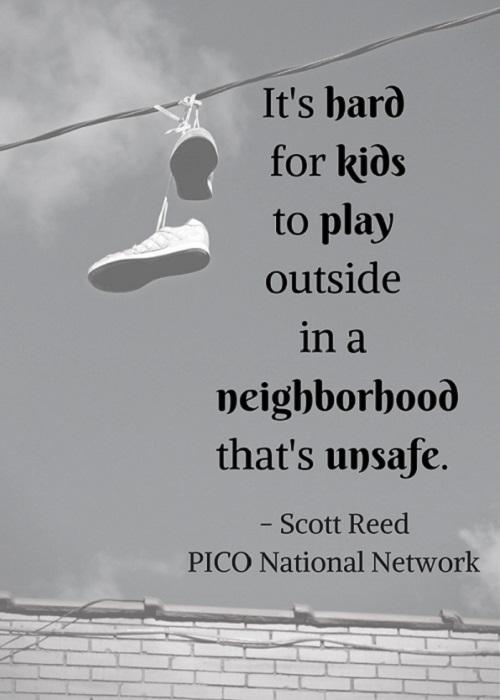Although National Childhood Obesity Awareness Month, a designation intended to raise awareness about the problem of obesity and show people how they can take steps toward a solution, has passed, we want to remind everyone that the need to raise awareness has not. In the last generation, childhood obesity has increased more than fourfold in the United States. More than 23 million children and teenagers are obese or overweight, a statistic that health and medical experts consider an epidemic. And while the national childhood obesity rate has recently started to level off, and some cities and states are actually reporting declines, a troubling disparities gap persists. Rates of obesity and overweight remain highest among Black and Hispanic youths.
In response to this growing problem, we often hear well-meaning advice: Eat more fresh fruit! Don’t drink sodas! Exercise more! Take the stairs! Turn off that TV! In many people’s minds, the best way to end the problem of overweight children is to encourage individual willpower and self-discipline, one meal and step at a time.
Unfortunately, good advice alone will never solve the problem of childhood obesity. Obesity is often a disease of poverty highest among children of color living in low-income families. That’s not because struggling families don’t know the cumulative health consequences of potato chips and sugary drinks; it’s because structural economic disparities and powerlessness set up a series of obstacles to live a healthy life.
It’s hard for parents to prepare healthy meals when their local market specializes in alcohol, candy and soda. It’s hard for kids to play outside in a neighborhood that’s unsafe. And it’s almost impossible to worry about diabetes at 50 when you’re scared about being shot before the age of 18.
The PICO National Network, where I work, approaches childhood obesity in a unique way. PICO is a coalition of community organizing projects in 150 cities across the country. Our affiliates bring together churches, schools and community centers, and engage their members in the work of building healthier, safer and more just communities. When volunteer leaders in our local organizations are addressing childhood obesity, they grapple with the larger social forces that make healthy lifestyles difficult for people in disadvantaged communities.
For example, fresh produce is often more expensive than processed food, particularly for low-income families who rely on Supplemental Nutrition Assistance Program (SNAP, formerly known as food stamps). So in Missouri, our PICO affiliate, led by community leaders, got together to figure out how they could help people on food stamps afford fresh produce. They persuaded lawmakers to create a pilot program allowing families to use SNAP benefits (food stamps) at local farmers’ markets, and giving people extra food stamps for every dollar spent at a farmers’ market.
Communities of color often have a disproportionately high number of people returning from the criminal justice system, many of whom struggle to find a decent job and reintegrate into their communities. A law that prevents those incarcerated on drug charges from receiving SNAP benefits makes it even harder for them, and in turn keeps many kids in Latino and African-American neighborhoods from eating healthy meals. In Ohio, Ohio Organizing Collaborative, is working to end the policy that bans ex-felons from receiving SNAP benefits.
Many children growing up in low-income families rely on school food for nutrition, so it’s important that they have access to healthy meals and snacks throughout the day.
In Florida, a group of clergy and congregation members has asked the governor and the Commissioner of Agriculture to make sure Florida public schools serve healthy food that meets federal guidelines. We also tackle the problem of obesity at a deeper level. In recent years, data from public health researchers has demonstrated repeatedly that powerlessness itself leads to poor health. When you lack the ability to make meaningful choices about your life, you are more likely to suffer from stress-related illnesses. You are also more likely to forgo those opportunities you do have to make healthy choices for your family.
As community organizers, we offer leadership training that teaches people to use the tools of democracy to improve their communities: how to lead a meeting, talk to an elected official or speak to a reporter.
Our federations are led by ordinary people who have learned to use the levers of power to bring resources and political attention to their communities. And it turns out that building skills like this can actually make people healthier. When people who are used to being marginalized and ignored begin to articulate their needs and speak out for their neighborhood or community, they are increasingly able to take control over all aspects of their lives. Right now, our approach is grassroots and small-scale, but we’re growing and hope you can join us to help build a world where everyone can thrive.



The views and opinions expressed in this post are those of the author(s) and do not necessarily reflect those of MomsRising.org.
MomsRising.org strongly encourages our readers to post comments in response to blog posts. We value diversity of opinions and perspectives. Our goals for this space are to be educational, thought-provoking, and respectful. So we actively moderate comments and we reserve the right to edit or remove comments that undermine these goals. Thanks!